Democrats go soul-searching in Iowa
- Published
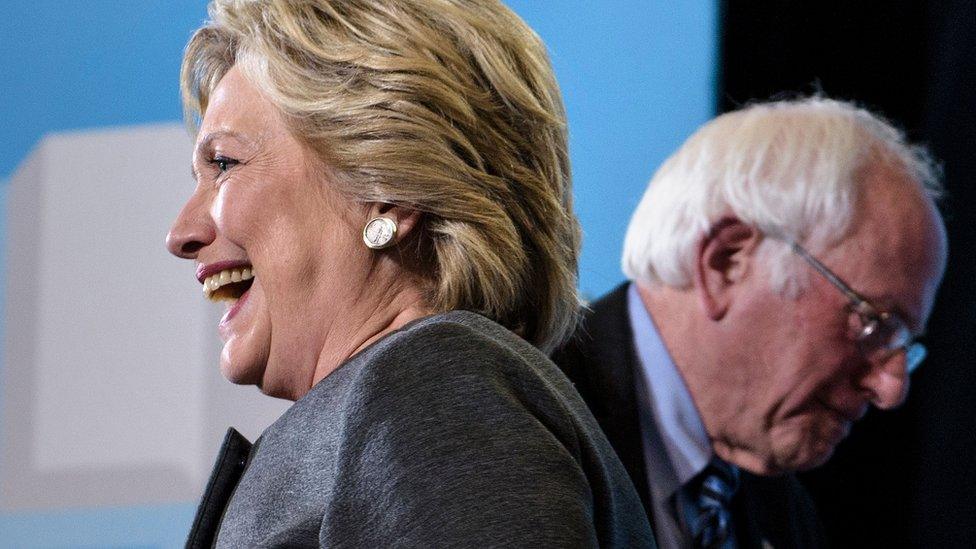
After 2016 defeats, Democrats are being pulled in different directions
On a mild late-November night in Iowa, Alec Baldwin gave Democrats what they wanted to hear - and then told them what he thought they needed to hear.
The actor, who is probably most famous at this point for his scathing impersonation of Donald Trump on the comedy show Saturday Night Live, led with a reprise of his role, sans wig and makeup. He quipped about the curriculum of an imagined "Trump University" and read a presidential letter to the "Electoral College losers" in the audience - as the roughly 3,000 Democratic officeholders and activists who gathered in a Des Moines convention hall for the state party's annual Fall Gala laughed along.
"I've studied Trump longer than anyone should be forced to," he joked.
About halfway through his speech, however, Baldwin turned serious. He said the Democratic Party had become riddled with complacency and riven by disunity. He warned that leftover animosity from the 2016 presidential primary between pragmatist/moderate Hillary Clinton and socialist insurgent Vermont Senator Bernie Sanders needs to be put aside.
"Both were infinitely better suited for office than Donald Trump," he said. "There's no picking up your ball and going home."
He acknowledged the bitterness and doubt that Democrats everywhere felt after Donald Trump's presidential victory, noting that he still chokes on the words "President Trump". He added, however, that hoping for the president's impeachment is a fool's errand.
Alec Baldwin on playing Trump: 'I'm channelling people's frustration'
"We've got crucial work to do right now for 2018," he said, pointing to the upcoming congressional midterm elections. "We've got party building to do on a scale that perhaps we've never known."
It was a message many of the Democrats in attendance welcomed.
"I thought it was amazing," said Adam Feites, a salesman from Des Moines. "Not only did he fire up the base, but he was telling a lot of hard truths. We only have ourselves to blame for the loss last election, and we need to get out there and make it happen."
For Democrats these days, however, even a call for unity prompts some dissent.
"Unity is a weird thing to be talking about at this early stage of the game," said Evan Burger, a senior organiser for Iowa Citizens for Community Improvement. "I hear unity right now, in 2017, and it's used as a cudgel to force people to fall in line. The more important thing for the party to do is to have these serious conversations about the real divides within the party and hash out what is a winning strategy."
A question of direction
At the heart of this "conversation" among Democrats across the US is what the party should stand for and how it should go about achieving its goals. The topic is particularly relevant in Iowa, which as the first state to hold a presidential nominating contest will play an outsize role in determining the next Democratic presidential nominee.
Will the Democrats embrace ambitious, sweeping progressive big-government priorities such as universal healthcare, free college tuition, a $15 national minimum wage, gun control and a tax structure that reduces income inequality? Or will a winning political message focus on bipartisanship, problem-solving, economic growth and job-creation, offering a contrast to the perceived divisiveness and belligerence of the Trump era?
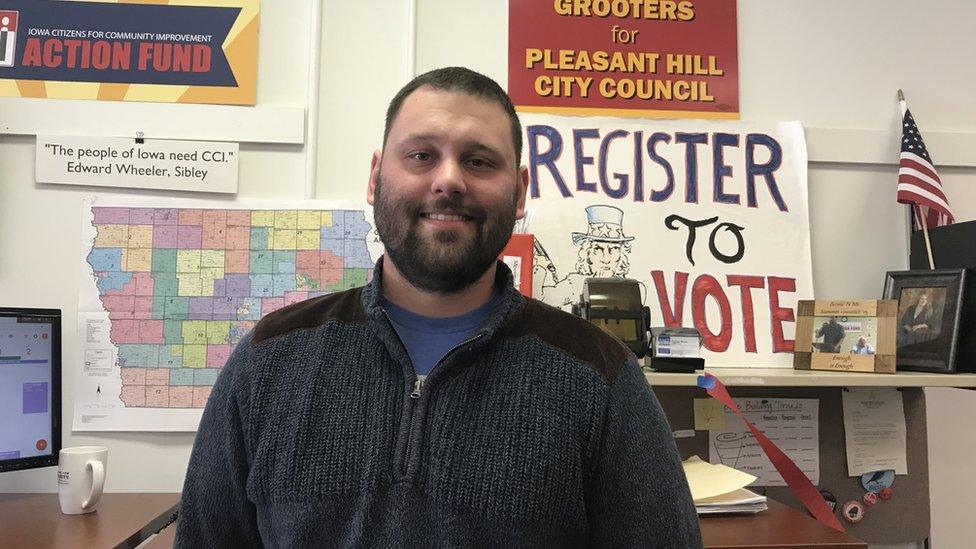
Evan Burger would welcome Bernie Sanders back to Iowa in 2020.
Baldwin noted, at one point, that a future Democratic president may be among those in the Des Moines ballroom, listening to his speech. But where will the candidates of the future come from? Will they be drawn from the ranks of activists, party loyalists or non-politicians?
Burger, who was a senior Iowa staffer in the Sanders presidential campaign, comes down firmly on the "bold issues" backed by anti-establishment voices side of the divide. He says with enough determination, ideas that once were deemed radical, like government-provided healthcare and a boost in the minimum wage, will become politically viable.
"Let's fight for what we actually want, rather than compromising with ourselves before we even talk with the other side," he says. "At least people will know that we stand for something."
An early runner
It's still three years from the next US presidential election, and at least a year until even the hints of a Democratic presidential field begin to take shape, of course.
Big names, like the aforementioned Mr Sanders, former Vice-President Joe Biden and a raft of Democratic senators - including Cory Booker of New Jersey, Elizabeth Warren of Massachusetts, Kamala Harris of California and Chris Murphy of Connecticut - have largely sidestepped Iowa for the time being.
At this point, the only candidate officially in the race is Maryland Congressman John Delaney. The businessman-turned-politician, who announced his bid in July, has already visited Iowa five times and resides at the opposite end of the Democratic spectrum from Mr Sanders and his fellow progressives.
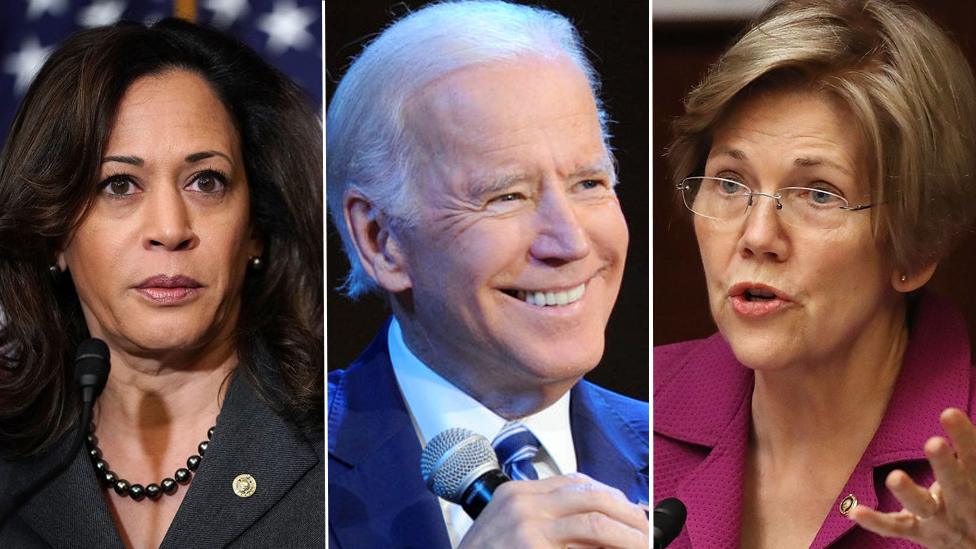
Senators Kamala Harris and Liz Warren and former Vice President Joe Biden have been mentioned as potential candidates, but none are anywhere close to declaring
"The Democratic Party can do a much better job really talking to people about what they care about, as opposed to talking to people about what we care about," he says.
"For most Americans who don't spend a lot of time on politics, what they're looking for is elected officials who are going to talk about their jobs, their pay, opportunity for their kids and being part of a government that's actually going to get things done, as opposed to fighting all the time."
He says politicians make "pipe dream" promises that people know they can't keep - the same sort of criticism Mrs Clinton lobbed at Mr Sanders during the 2016 primaries. Instead, Mr Delaney advocates for more worker training to adjust to a modern economy and free trade as a path to economic success, and seeks to restore American faith in government. He points to Donald Trump's election as a symptom, not a cause, of a broken US political system.
"The American people have basically been told by the political parties across the last several decades that everyone's either sell-out or a fool," he says. "They've basically been conditioned to reject government and, as a result, we end up with Donald Trump."
Delaney is a darkest of dark horses in the 2020 presidential race, which explains why he's trying to get the jump on the pack in Iowa and New Hampshire, another early voting state.
Working in his favour, however, is the likelihood that the upcoming Democratic field will be among the most crowded in recent memory - a hodgepodge of candidates from a variety of backgrounds, offering Democratic voters a diverse range of options from which to choose, both ideologically and stylistically.
A crowded field in Iowa
Last week's Iowa Gala, beyond being a showcase for Baldwin's comedic stylings and political musings, also offered a preview of just how chaotic the 2020 contest might be for Democrats. Next year Iowa will hold a governor's election, with Democrats already vying to take on incumbent Republican Kim Reynolds.
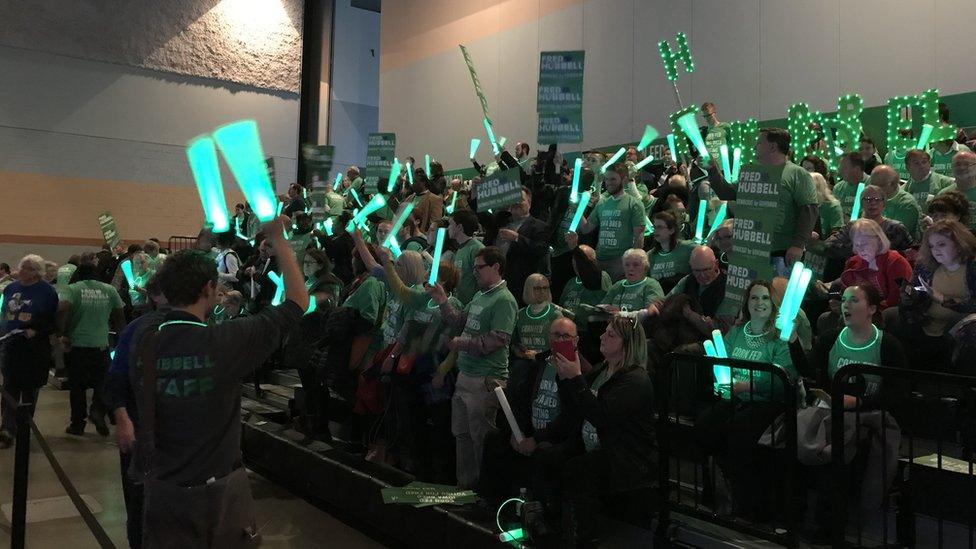
Democratic governor hopefuls had enthusiastic crowds at the Iowa Fall Gala.
Before Baldwin spoke, seven of the most prominent candidates gave five-minute speeches - and many of them brought along vocal cheering sections seated in bleachers at the back of the hall. Supporters waved lighted signs, swung glowing green wands, banged inflatable noisemakers and otherwise turned the proceedings into something more akin to a high-school pep rally.
The field itself includes a businessman who has never held elective office, a union activist, a young, charismatic state senator, the first black mayor of Iowa City, a veteran Iowa legislator and a former head of the Iowa Democratic Party.
"It's basically a situation where all the party leadership got wiped out, so there's no-one behind the scenes to say, OK, we're going to run this person in this race, and you need to hold off," says Pat Rynard, a former Democratic staffer who runs the Iowa Starting Line, a blog about state politics.
"You have some that are running on more centrist, economy and competence and personality-focused campaigns," he says. "You have some who are adopting most of the Bernie Sanders platform without quite the Bernie Sanders attitude. And then you have some that are very much trying to run as both Bernie Sanders on policy platform and persona, and some who are going even further to the left of what he was proposing."
Iowa voters, he says, have "all the options they want".
After the speeches, Matt Peirce - a legal assistant from the Des Moines suburb of Urbandale - stood in the convention centre hallway, cheering for his candidate, union organiser Cathy Glasson.
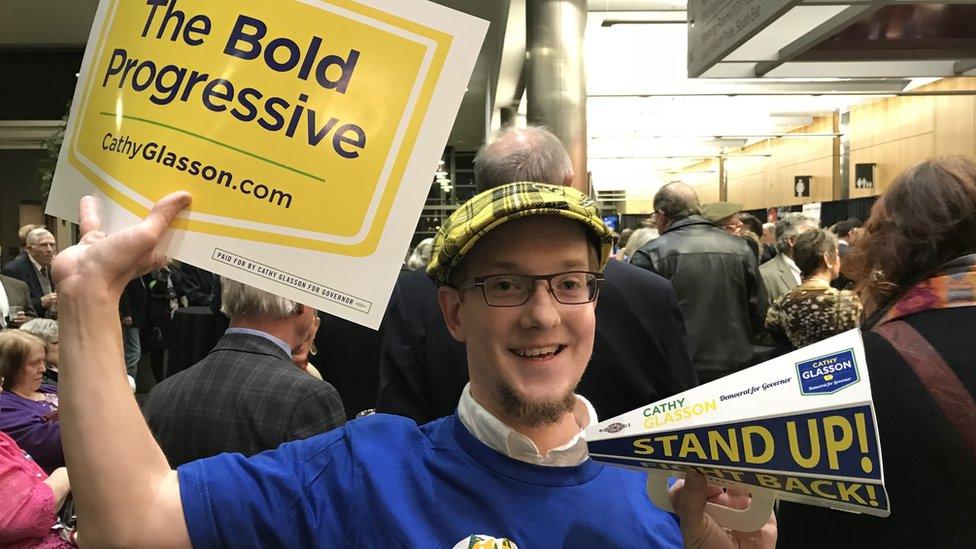
Matt Peirce says he's tired of Clinton-style moderation in the Democratic Party
"I believe progressive values are going to help people like me," he says. "Clean energy, renewable fuels, wind energy, racial justice, pay equity for women, so many things have been shoved under the rug, and Cathy Glasson has a vision that is different and will lift everyone up."
As is the case nationwide, sexual harassment and the #metoo movement is casting a shadow on Iowa politics. Earlier this year, a Republican legislative staffer won a $1.75m (£1.3m) settlement from the state when she was fired after filing a report about rampant sexual harassment in the statehouse - something three of the candidates directly mentioned in their speeches.
"How many of you have felt the sting of harassment in your life?" asked Andy McGuire, the former state party head. "I, too, have felt the pain of not being valued. As governor, I will change a culture that says it's OK to harass and abuse another and get away with it."
LeAnne Oldenburger, a teacher from Ottumwa, said after the speeches that the sexual harassment issue, which has since led to the resignation of Senator Al Franken from neighbouring Minnesota, should be a "wakeup call" for politicians across the country.
"I'm glad Democrats are addressing it and not just saying, hey, it is what it is," she said, adding that the Republicans - from the Iowa's woman governor on down - have done nothing to solve the problem.
'Disaster mode'
If the stakes are high for Democrats nationally in 2020, looking to unseat Trump after only one term in office, Iowans face a similar situation, with Republicans controlling the governorship, the legislature, both US Senate seats and all but one of the state's congressional districts.
"In another election year, in another era, we might think a little differently, but right now it's disaster mode," Reynard says.
Part of what caused the "disaster" at the national level was that states like Iowa, which had been reliably Democratic, went for Mr Trump. The state, twice carried by Barack Obama, had a 15.9% swing to the right from 2012 - the largest in the nation. If Democrats want to find a path to victory in 2020, testing out possible messages, policies and candidates in Iowa in 2018 could be valuable.
"A big problem for Iowa Democrats is some of our campaigns have been influenced a little too much by national committees in recent years than by our candidates' ability to come off as authentic," Reynard says. "We've relied too much on really smart people who know all their data and analytics, and I think we kind of lost the soul of the party and what we're actually fighting for."